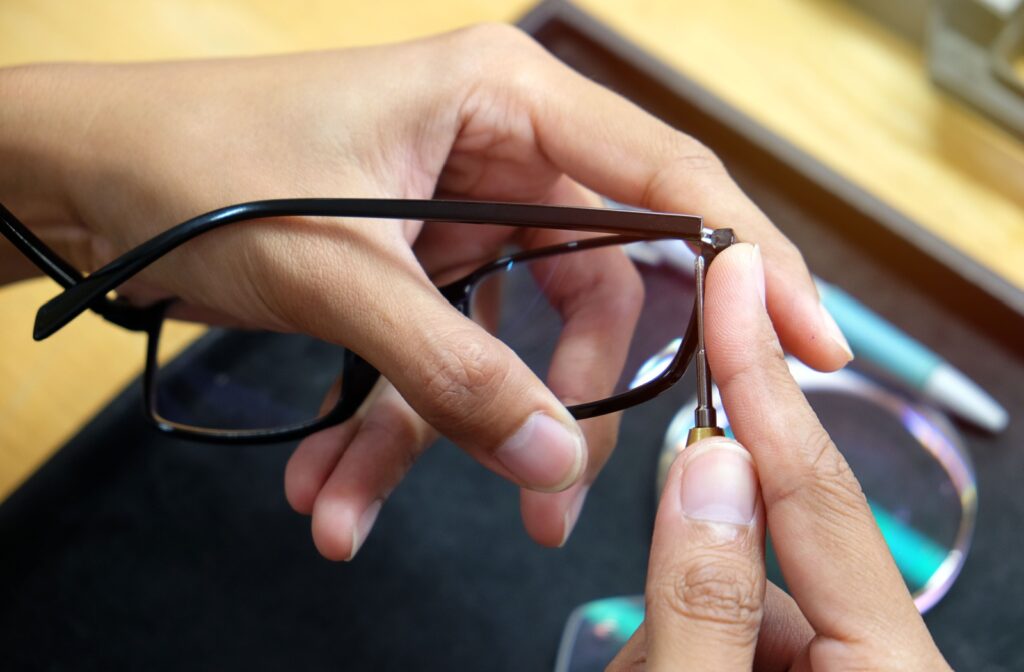Glasses do more than help you see clearly—they’re also a long-term investment and, for many people, an extension of their personality. But no matter your style, comfort and functionality should always come first.
So, how should glasses fit? Properly fitting glasses should feel comfortable on your face, sit evenly across your nose, align with your eyes, and stay in place without pressure or slipping.
In this blog, we’ll walk you through how to tell if your glasses fit correctly, what measurements matter, and why getting the right fit is essential for long-term eye health and comfort.
Key Measurements That Determine Fit
Before you can judge the fit of your glasses, it helps to understand a few measurements that you’ll often find marked on the inside of the arms of your frames:
- Lens Width: This is the horizontal width of each lens at its widest point. It affects how the glasses sit across your face.
- Bridge Width: This is the distance between the lenses—the part that spans your nose. It determines whether the glasses pinch or slip down.
- Temple Length: Also called arm length, this measures from the hinge of the frame to the end of the arm that wraps around your ear.
We can help you take these measurements and match them with the right frame style and size. In fact, buying your glasses through an optometrist’s office is a great way to ensure proper fit, additional support, and adjustment services are included in your purchase.
How to Know If Your Glasses Fit Well
There’s no single “perfect fit” for everyone—faces and heads come in all shapes and sizes. However, several key areas can help you determine whether your glasses are sitting properly.
1. Overall Comfort
Since most people wear their glasses throughout the day, comfort should be top priority. Glasses that are too tight can cause pressure points, soreness behind the ears, or even headaches. On the other hand, loose glasses may slip constantly and need frequent adjusting.
Remember, even well-fitting glasses may shift slightly over time due to wear and tear, temperature changes, or handling. Fortunately, most frames can be adjusted to restore comfort.
2. Eye Alignment & Pupillary Distance
Your pupils should align with the optical centre of your lenses. This requires an accurate pupillary distance (PD) measurement, which measures the space between your pupils when looking straight ahead.
If your PD is off—even by a few millimetres—it can result in visual distortion, eye strain, or difficulty focusing. Additionally, the lenses should sit evenly in relation to each eye, with symmetrical spacing from the outer corners of your eyes to the lens edges.
Segment height and optical center placement are especially important for multifocal or progressive lenses. If these are misaligned, you may struggle to focus through the correct zone of your lenses, leading to headaches or an inability to adapt to your new eyewear.
3. Nose Bridge Fit
The bridge of the glasses rests on your nose and plays a big role in overall stability. If the bridge is too wide, your glasses will slip. If it’s too narrow, it can leave red marks or pressure points.
Frames with adjustable nose pads offer more flexibility, while plastic or acetate frames often have fixed bridges that need to be chosen carefully to suit your nose shape.
4. Temple or Arm Length
The temple arms should gently hug your head without pressing too tightly. The ends of the arms should curve just behind your ears for secure placement.
If the temples are too short, the glasses can dig into the sides of your face or ears. If they’re too long, they may slide down or sit awkwardly. A good fit means the frames stay put—even with light movement—without needing constant adjustment.

Why Proper Fit Matters
It’s easy to underestimate the importance of well-fitting glasses, especially if you’re new to wearing them. But poorly fitted eyewear can have a number of consequences:
- Headaches & eye strain: If your lenses don’t align properly with your eyes, it can cause discomfort and fatigue.
- Uneven wear: Glasses that sit lopsided or slide constantly may affect how you perceive your prescription.
- Longer adjustment time: Your brain has to work harder to adapt to a misaligned fit, delaying the time it takes for you to feel comfortable with your new glasses.
- Irritation or marks: Ongoing pressure on your nose or ears can lead to irritation or even skin dents over time.
Precise optical center and segment height placement also ensure that your lenses function as intended, particularly for complex prescriptions. Even small inaccuracies can impact your ability to read, drive, or work comfortably.
A proper fit isn’t just about looks—it’s about protecting your vision and ensuring your glasses enhance your day-to-day life, not disrupt it.
Finding the Right Fit (and Look)
If you already own a pair of glasses that fit well, you can use the measurements stamped on the inside of the frames as a guide when shopping for new ones. But if this is your first time buying glasses—or if nothing seems to sit quite right—don’t worry. We’ll help you find the correct size, style, and shape for your face.
Keep in mind that a frame can technically “fit” but still feel wrong due to the design. For example, wide frames may technically match your measurements but still feel bulky or slide if the shape doesn’t suit your facial structure. The best solution? Try on multiple pairs and let us make small adjustments to find your ideal match.
Enjoy the Benefits of Properly Fitted Glasses
Well-fitting glasses make a world of difference. They feel good, function correctly, and—just as importantly—they help you look and feel like yourself. Whether you need a frame adjustment, want help choosing a flattering style, or are ready for a completely new pair, professional guidance makes the process smooth and enjoyable. At EyeCare Niagara in Niagara, ON, our friendly and experienced team is here to help you find your perfect fit. From prescription updates to expert fittings, we’ll ensure your glasses work for your vision and lifestyle. Book your visit today and see the difference that properly fitted glasses can make.




